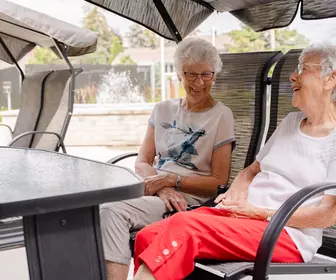10 Signs It Might Be Time to Consider Senior Living
Choosing to move to a retirement residence is an important decision; one that takes a lot of research, preparation, and decision-making. It can be challenging to understand the telling signs that signify it may be time to consider senior living, especially if this is uncharted territory for you or a loved one. Nevertheless, there are valuable steps designed to support you in this season of life. If you are currently weighing whether to make the move to a senior living community, it’s important to first evaluate your current living situation. According to the Ontario Retirement Communities Association (ORCA), asking yourself the following questions can help you make the decision:
- Would I benefit from living with others near my age?
- Do I want better access to social activities?
- Am I lonely living on my own?
- Have I been neglecting to keep up with my housework?
- Do I often wish someone could cook my meals for me?
- If I fall, will I struggle to take care of myself?
If you answered yes to any of these questions, or relate to any of the following signs, moving to a senior living community might be a good option for you:
1. Limited mobility
Have you noticed a sudden decrease in your mobility? If you can’t get around in your home as easily as you used to—struggling with things like stairs, sloped driveways, deep bathtubs, or even accommodating your walker in a bathroom or kitchen—it may be time to consider moving into a retirement residence with an accessible layout and design, so that your daily activities are simplified and safer. Additionally, are you nervous that if you experience a fall, or encounter complications with your medication, that no one will be around to assist you? At a retirement residence, all you have to do is press a call button, and a staff member will arrive to help. Relocating provides many seniors with peace of mind, knowing help is close by if they come to need it.
2. Social isolation
On average, how often do you feel you’re being social? If your friends aren’t nearby, it may be hard to spend time with them, especially if neither of you drive. As you age, it’s important to stay socially active to reduce feelings of loneliness and isolation. By moving to a retirement community, you’ll be surrounded by peers and staff, and there are plenty of opportunities to be part of a group, whether it’s in the recreation room on bingo night, in the dining room during meals, or as part of an outing or class.
3. Inability to keep up with home maintenance
Have you been keeping up with household chores like cooking, dishes, laundry, or yard work? If household chores and maintenance are becoming overwhelming, senior living can offer a solution. At a retirement residence, maintenance jobs, such as shoveling snow, mowing the lawn, and fixing the plumbing, are all taken care of by staff. Retirement living is about relaxing and focusing on your hobbies, so the days of doing chores are over!
4. Health management concerns
As an older adult, you may find you need more support as you age. If you’re still living in your own home, it can be difficult to efficiently manage your health routines, such as taking daily medications. Opting for personal home care as a solution will most likely require a significant amount of time and money. On the other hand, a retirement community is equipped with trained and caring staff who are onsite 24/7 to assist residents with their daily health routines. A retirement residence eliminates the feeling of unsafety from being home alone at night or worry that help won’t be readily available in an emergency. Moreover, as your care needs evolve over time, you can comfortably age in place and benefit from a range of care services.
5. Fewer opportunities for leisure and recreation
Retirement is the perfect time for older adults to rediscover old hobbies or adopt new ones. Whether it's a physical activity or one that's more cognitive in nature, a hobby is a healthy way for seniors to stay active and express their creativity. It may be time to consider senior living if you find it challenging to pursue your hobbies and engage in recreational activities. It may be that you don’t have access to transportation, or a community of like-minded people to share these hobbies with. Nevertheless, a retirement residence offers various opportunities for older adults to pursue leisure activities with their peers including book clubs, yoga classes, gardening, and more.
6. Cognitive challenges
Consider your day-to-day living. Do you struggle with disruptive memory loss? Do you experience confusion with places and time? Is it difficult for you to communicate or follow other people’s conversations? If you or a loved one answered yes to any of these questions, then you may be experiencing symptoms of mild cognitive impairment, dementia, or Alzheimer’s.
Retirement residences seek to support older adults with cognitive challenges, dementia, or Alzheimer’s, along with their families, through specialized memory care and memory living programs. Some Chartwell retirement communities are equipped with dedicated and secure memory care floors, where residents and their spouses can comfortably live, and trained, caring staff can help them lead meaningful and fulfilling lives.
7. Living alone
Seniors who live alone are at greater risk for social isolation, depression, and loneliness. They also are less likely to take proper care of their health, as there’s no one to keep them accountable. It’s easier for seniors who live alone to neglect a healthy diet and physical activity. A retirement residence provides opportunities to maintain an active lifestyle, socialize, and build community, which are essential for good mental health and combating feelings of loneliness.
8. Growing pressure and stress on caregivers
Your health and well-being do not just affect you; they also affect those closest to you. Family and loved ones are often willing and eager to help seniors who require an increasing amount of care and attention. However, when juggling the tasks involved in taking care of an aging parent or relative, you may notice that it’s easy for caregivers to forget about their own well-being. Since taking care of an aging loved one can be demanding, both physically, emotionally, and even financially, caregivers frequently neglect to set aside time for themselves.
Moving to a retirement residence may help to alleviate the pressure placed on caregivers, as caring and trained staff are available to take over consuming tasks. Caregivers can have peace of mind knowing that their loved one is in a secure environment that can help them thrive physically, emotionally and socially.
9. Nutritional concerns
Seniors who live at home tend to neglect their diet and nutrition, as related tasks like grocery shopping, cooking, and kitchen clean-up become challenging to execute over time. Good nutrition is an important component of healthy aging, so if you have difficulty going to the supermarket or fixing yourself a well-balanced meal, it may be time to consider senior living.
Retirement homes take away the stress of cooking a meal for yourself every day. With professional chefs available to create mouth-watering dishes made from fresh, seasonal ingredients, residents can savour their meals without the burden of putting dishes away or cleaning up the kitchen. Instead, they can enjoy the company of their fellow residents or family who come to visit.
10. Transportation issues
As an older adult, driving may no longer be as accessible as it once was. While there are advantages to this, namely the elimination of car-related insurance, repair, and maintenance costs and responsibilities, it also means that time spent outside the house and socializing with others reduces significantly. In many Chartwell retirement homes, chauffeured transportation is readily available to residents and group outings are often arranged so that residents can partake in engaging activities outside the building.
How to transition to senior living
Transitioning to senior living is a process that requires in-depth discussions, planning, and decision-making. It is beneficial for older adults and their families to begin the process sooner rather than later, to ensure peace of mind. If you feel as though you relate to the points highlighted above and want to explore the further benefits and time considerations of a retirement lifestyle, check out Is Now the Right Time for Senior Living? You may also benefit from Chartwell’s Respite Program or Short Stay, which gives seniors the opportunity to try out senior living without the commitment of signing a lease. This allows you to get a firsthand look at what retirement living looks and feels like on a daily basis.
Additionally, our Why You Should Move Into Senior Living Now guide provides an extensive framework where you will find helpful insights and expert advice that can help you assess the many benefits of this decision. Begin your journey to senior living by filling out the form today. After you complete the form, you will be able to download our guide instantly.

